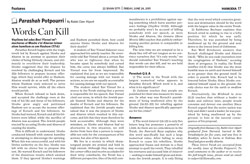 Rabbiner Ozer Alport hat eine Kolumne in der Freitagsausgabe der charejdischen Zeitung HaModia. In dieser greift er sich kurze Abschnitte aus dem aktuellen Wochenabschnitt aus und beleuchtet diese eingehend. Das ist in der Zeitung recht knapp gehalten, aber lesenswert (vorausgesetzt man interessiert sich für den Wochenabschnitt und hat ein wenig Vorwissen). Es gibt aber noch eine ausführliche Fassung. Diese ist kostenlos und kommt wöchentlich per Mail. Das funktioniert nicht über eine ausgeklügelte Website, sondern einfach, indem man Rabbiner Alport eine Mail schickt und ihn darum bittet, das Parsha Potpourri auch zu erhalten. Er wünscht sich mehr Leser und hat nichts dagegen, wenn man seine Artikel ausdruckt und verteilt. Schreibt er jedenfalls in den wöchentlichen Mails. Wer also die Mail erhalten möchte, schreibt an oalport@optonline.net .
Rabbiner Ozer Alport hat eine Kolumne in der Freitagsausgabe der charejdischen Zeitung HaModia. In dieser greift er sich kurze Abschnitte aus dem aktuellen Wochenabschnitt aus und beleuchtet diese eingehend. Das ist in der Zeitung recht knapp gehalten, aber lesenswert (vorausgesetzt man interessiert sich für den Wochenabschnitt und hat ein wenig Vorwissen). Es gibt aber noch eine ausführliche Fassung. Diese ist kostenlos und kommt wöchentlich per Mail. Das funktioniert nicht über eine ausgeklügelte Website, sondern einfach, indem man Rabbiner Alport eine Mail schickt und ihn darum bittet, das Parsha Potpourri auch zu erhalten. Er wünscht sich mehr Leser und hat nichts dagegen, wenn man seine Artikel ausdruckt und verteilt. Schreibt er jedenfalls in den wöchentlichen Mails. Wer also die Mail erhalten möchte, schreibt an oalport@optonline.net .
Ein Beispiel aus der Mail zur Paraschah Chukat: ??? ?? ??? ????? ????? ???? ??? ???? ????? 19:2
The Gemora in Kiddushin (31a) relates the tremendous dedication of a non-Jew named Dama ben Nesina to the mitzvah of honoring his parents. The Sages once came to him to purchase something for a tremendous amount of money, but the key needed to access it was underneath the pillow on which Damas father was sleeping. Although Dama would have made a tremendous profit if he woke his father to get the key, he chose to honor his father and refused to inconvenience him. The Gemora adds that many years later, Hashem rewarded Dama when a rare parah adumah (red heifer) was born in his herd. When the Sages heard about the cow, they came to his home to purchase it. Dama told them that he recognized the cows value to them and knew that they would agree to whatever price he demanded for it. Nevertheless, he asked them to pay only the money which he lost as a result of honoring his father. Why did Hashem specifically reward Dama with a parah adumah, and what lesson is the Gemora teaching us through this episode?
The Darkei Mussar suggests that the Gemora is using this incident to teach a fundamental difference between Jews and non-Jews in their approach to doing mitzvos. A Jew would never be willing to sell or trade the reward that he receives for his mitzvah performance, yet Dama had no compunctions about doing so. In fact, he was the one who insisted on it.
Perhaps it is for this reason that he was specifically rewarded with a parah adumah. If the prosecuting angel attempts to use Damas exemplary honor for his father to challenge the Jewish peoples dedication to this mitzvah, they can respond by pointing out that he had no reservations about selling his reward for the mitzvah. The Kotzker Rebbe goes one step further, pointing out that while Dama was willing to trade away the logical mitzvah that he performed, the Jewish Sages were willing to spend an exorbitant amount of money to fulfill a mitzvah whose understanding was completely beyond them. Rav Moshe Leib of Sassov offers an innovative explanation of an expression used in the Mussaf prayers on Rosh Hashana. He begins by noting an interesting difference between the proper attitude toward mitzvos and sins. It is preferable to remember sins constantly (Tehillim 51:5) so as to fully repent them and to be careful not to repeat them. Regarding mitzvos, however, it is advisable not to remember and dwell on ones successes, which may cause a person to become haughty and complacent. Instead, it is better to leave them in the past and to always focus on future growth and accomplishments. At the end of the section of the Remembrances section of the Rosh Hashana Mussaf prayers, we say ?? ???? ?? ??????? ??? ??? ????? You (Hashem) remember everything that is forgotten. In other words, Hashem remembers whatever we forget and forgets whatever we remember. If a person acts properly, remembering his sins and forgetting his mitzvos, Hashem will overlook his misdeeds and focus on recalling his accomplishments. If, however, the person forgets his sins and arrogantly dwells on his mitzvos, Hashem will meticulously remember each sin while overlooking all of his good deeds. In this vein, the Darkei Mussar writes that although Dama was blessed with the birth of a parah adumah in his herd, several years had passed and there was no reason to assume that this was his reward for honoring his father. The Gemora is teaching us that the non-Jewish approach is to dwell on the past and focus on the good deeds that he has already performed, whereas a Jew looks to the future and is never satisfied with what he has already accomplished. © 2011 by Ozer Alport.